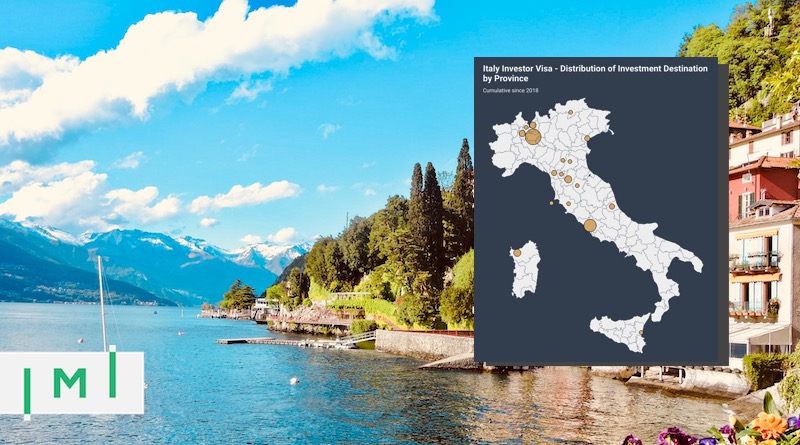Applications for Italy’s “Dolce Visa” Quadruple in 2021 as Investors Embrace Improved Terms
Launched at the end of 2017 and operational since early 2018, the Italian Investor Visa, or “La Dolce Visa”, saw a sharp uptick in applications in 2021 compared to 2020. In its first-ever statistical report on the program, Italy’s Ministry of Economic Development revealed it had received 40 applications for the program in 2021, up from just 11 in 2020 and 6 in 2019. Since the start in 2018, the Ministry reports having received 64 applications, 50 of which it has approved.
The notable rise in interest for the program was "in part attributable to the new provisions introduced by [the Decreto Rilancio] of May 2020," the Ministry postulated in its report. The amendment halved the minimum capital requirements for both the ordinary business and innovative startup investment categories, to EUR 500,000 and EUR 250,000, respectively.
Perhaps an equally important cause for the suddenly improved prospects of La Dolce Visa, however, is one that the Ministry's report appears not to have considered at all:
“The Semplificazioni decree, of December 2020,” explained Marco Bersani, founder of Bersani & Partners International Law, in our article on the changes, “exempted golden visa investors from the physical presence requirements until now imposed on holders of all categories of Italian residency visas.”
Those rules, in effect, had obliged golden visa investors to physically remain in Italy for most of the year, a rarely-discussed but clear disadvantage in the golden visa market.
“This is a general rule applicable to all residence permits that states that the resident cannot stay outside of Italy for more than a half of the total duration of the permit,” clarified Bersani. “So, for example, if you had a two-year permit [the initial duration for golden visa holders], you could not spend more than one year outside of Italy (except if you could prove you had valid reasons). That general rule, though still applicable for all other residence categories, no longer applies to golden visa investors.”
In effect, the change reduced the physical presence day-count requirement for Italy’s investor visa to zero. The simple amendment moved La Dolce Visa from a position of clear disadvantage compared to its competitors to having the laxest physical presence requirement among all EU golden visas.
Another attractive amendment from December 2020 was to allow investor visa applicants to qualify by making the requisite investment through their companies, rather than as private individuals. That implies less personal financial risk and improved tax implications.
The Italian Investor Visa program provides for four types of investment, each with its own minimum investment requirements:
- EUR 2 million in Italian government bonds.
- EUR 500,000 in Italian shares.
- EUR 250,000 if investing in innovative startups.
- EUR 1 million donation to projects of public interest in Italy
The distribution of investment categories chosen by applicants, according to the statistics released yesterday, hint at applicants' appreciation of the ability to qualify through corporate, rather than private, investment. Of the 64 applications received so far overall, 43 have chosen to invest in Italian joint-stock companies. This despite the category's EUR 500,000 minimum investment requirement, which is double that of the startup investment category, indicating investors are willing to allocate more capital in exchange for risk-reduction.
All told, some EUR 18 million worth of investment has been realized under the program so far, though the Ministry said in its report that it expects this figure to rise to EUR 40 million shortly as already-approved applicants confirm their investments. The discrepancy between realized and expected investment is due to another applicant risk-reducing policy idiosyncratic to the Italian residence by investment program; unlike for many golden visa programs, that of Italy requires that applicants complete the investment only after they have received approvals.
The nationality distribution of Italy's golden visa also diverges from that of its rival European programs; at least 41% of applications so far have come from Anglosphere nationals. While Americans and Russians have each submitted 14 applications, Britons account for 11% of the total, followed by Canada at 8%. China, conventionally the largest source market for investor migrants globally, accounts for just 1 in 20 applications.
The report also detailed the Italian provinces in which applicants indicated they wished to reside (although they are not required to be present, applicants are asked to indicate where they will formally reside). Mirroring the preferences of applicants for Italy's Startup Visa program, investor visa applicants overwhelmingly chose the economically more dynamic northern regions, with concentrations particularly high in the Greater Milan area, which includes Novara, Varese, and Como.
Italy's removing the Dolce Visa's physical presence requirements altogether at the end of 2020 made it, in our words, a "real golden visa", i.e., a program that grants residence permits in exchange for investment while not making too steep demands on physical presence. For those that don't mind being physically present in Italy, residence permits are available without making any investment at all through Italy's Elective Residency Visa program, which, while requiring 183 days of presence each year, asks only that the applicant demonstrate a modest annual income.
If you like data-driven articles like this one, you'll love the IMI Data Center, the world's largest collection of investment migration statistics, with more than 350 graphs and charts on dozens of IM programs and markets.
Christian Henrik Nesheim is the founder and editor of Investment Migration Insider, the #1 magazine - online or offline - for residency and citizenship by investment. He is an internationally recognized expert, speaker, documentary producer, and writer on the subject of investment migration, whose work is cited in the Economist, Bloomberg, Fortune, Forbes, Newsweek, and Business Insider. Norwegian by birth, Christian has spent the last 16 years in the United States, China, Spain, and Portugal.



